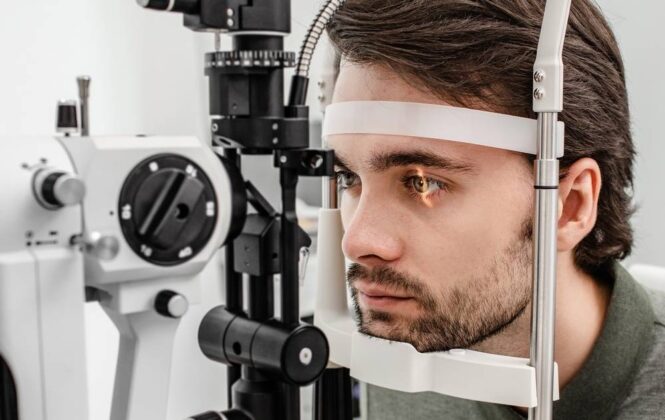Do you struggle to see things clearly in the distance but have perfect vision up close? Are you tired of constantly relying on glasses or contact lenses? And most importantly, are you wondering whether LASIK treatment could actually correct your nearsightedness and give you clear, hassle-free vision?
In this blog, we’ll explore how LASIK works to correct nearsightedness, its benefits, and whether it’s the right solution for you. So, let’s dive in and get started!
Contents
Can LASIK Correct Nearsightedness (Myopia)?
Yes, LASIK surgery is an effective and popular solution for correcting nearsightedness (myopia). This procedure can significantly reduce or eliminate the need for glasses or contact lenses, providing you with clear, stable vision.
So, if you’re struggling with myopia and want a permanent solution, LASIK could be the right choice for you!
How LASIK Surgery Corrects Nearsightedness: The Procedure Explained

LASIK surgery is a quick and effective way to correct nearsightedness (myopia). Here’s how the procedure works, step-by-step:
- Preparation: First, the surgeon will numb your eye with special eye drops so you won’t feel any pain during the procedure. You’ll be awake throughout, but your eyes will be completely relaxed.
- Corneal Flap Creation: A small, thin flap is made on the surface of your cornea (the clear front part of your eye). This flap is created using either a laser or a special tool. It is gently lifted to access the deeper layers of the cornea.
- Reshaping the Cornea: Using a precise laser, the surgeon reshapes the cornea. For nearsightedness, the laser removes small amounts of tissue from the center of the cornea, making it flatter. This helps light focus correctly on the retina at the back of your eye, improving your distance vision.
- Flap Repositioning: Once the cornea is reshaped, the flap is carefully placed back over the eye. It naturally heals on its own without the need for stitches.
- Recovery: The procedure typically takes 10-15 minutes for each eye. Most people notice clearer vision the next day, with minimal downtime.
In simple terms, LASIK corrects myopia by reshaping the cornea so that light focuses properly on the retina, allowing you to see clearly without glasses or contact lenses.
SMILE vs LASIK: Which is Better for Nearsightedness?
| Feature | SMILE | LASIK |
|---|---|---|
| Procedure Type | Small Incision Lenticule Extraction (SMILE) | Laser-Assisted in Situ Keratomileusis (LASIK) |
| Vision Correction | Corrects only nearsightedness and astigmatism | Corrects nearsightedness, astigmatism, and farsightedness |
| Corneal Flap | No corneal flap created | Corneal flap is created |
| Surgical Time | Around 30 minutes | Around 10-15 minutes |
| Recovery Time | Longer recovery time | Quick recovery, most see improvement the next day |
| Invasiveness | Less invasive, only a small incision | More invasive due to flap creation |
| Ideal for | Nearsightedness and astigmatism | Nearsightedness, astigmatism, and farsightedness |
| Suitability for Dry Eyes | Not ideal for those with dry eyes | Better suited for dry eyes when flapless options like CustomEyes are chosen |
In conclusion, LASIK is generally considered the more versatile and faster option for treating nearsightedness, astigmatism, and even farsightedness, while SMILE is a good option for those with nearsightedness and astigmatism but may have a longer recovery time.
Does LASIK Permanently Fix Myopia?
Yes, LASIK surgery can permanently fix myopia (nearsightedness) by reshaping the cornea to allow light to focus directly on the retina, correcting the blurred vision associated with myopia.
Once the cornea is reshaped, it typically provides long-lasting results, eliminating or significantly reducing the need for glasses or contact lenses. However, it’s important to note that LASIK doesn’t prevent age-related vision changes like presbyopia (age-related farsightedness). In some cases, a small number of people may experience a slight change in vision over time, but for most, the results are permanent and stable.
Can Nearsightedness Come Back After LASIK?
In most cases, nearsightedness (myopia) does not come back after LASIK surgery. The procedure reshapes the cornea, providing long-lasting correction for myopia. However, in some cases, especially if your vision changes due to age or hormonal shifts, your eyesight may change slightly over time. This is known as regression, and while it’s rare, some people may need a touch-up procedure years after their initial LASIK surgery.
It’s important to consult with your eye surgeon before the procedure to ensure you’re a good candidate and that your eyes are stable enough for LASIK.
Is LASIK Worth It for High Myopia?
Yes, LASIK surgery can be a worthwhile solution for people with high myopia (severe nearsightedness), but there are some considerations to keep in mind. For high myopia, LASIK can significantly reduce or even eliminate the need for glasses or contact lenses, improving quality of life.
However, people with high myopia may be at a higher risk of complications or corneal thinning, and in some cases, the amount of tissue removal required may exceed what is safe for LASIK. Custom LASIK or alternative procedures like phakic IOLs may also be recommended for those with extreme myopia.
It’s essential to have a thorough consultation with your ophthalmologist to determine if you’re a suitable candidate for LASIK or if other options like SMILE or lens implants would be more appropriate.
Conclusion
When it comes to correcting nearsightedness, LASIK stands out as the better option for most people due to its versatility, quick recovery, and ability to treat a range of vision issues. Whether you’re dealing with nearsightedness, astigmatism, or even farsightedness, LASIK offers a fast and effective solution to improve your vision without the hassle of glasses or contact lenses.
Ready to experience the freedom of clear vision? Book your free consultation for LASIK surgery at EyeMantra today and start your journey toward better vision! Call +91 9711116605 now!



